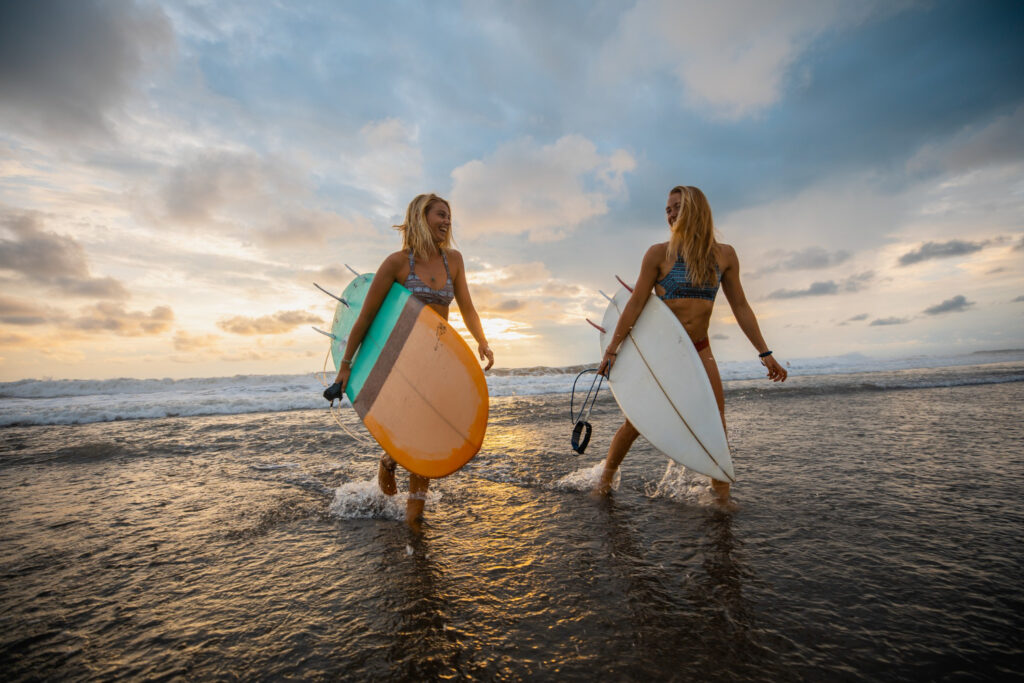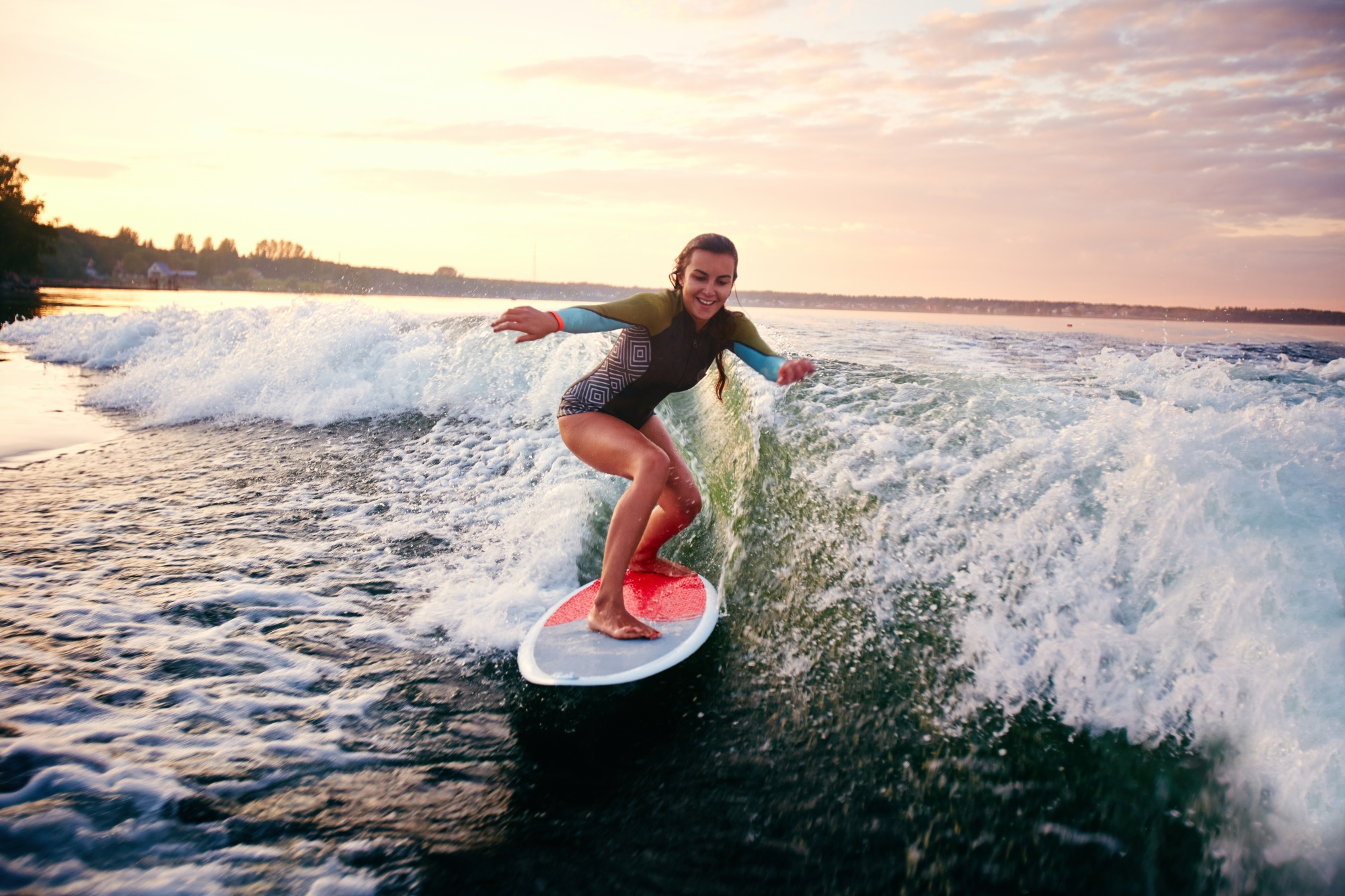Do you know your foamies from your fins? Choosing your first surfboard can feel like an impossible task when faced with so many technical terms and opinions and with such a huge range of possibilities out there. It can feel like an overwhelming choice, so our beginner’s guide is designed to help you to decipher the lingo and figure out exactly what you need and want from your first board.
We know surfing inside out and we’re always happy to help you to find the right option so that you can get out there and enjoy the ocean. There’s nothing like getting it right and with our help, you’ll be up there riding the waves in no time. Read on to find out where to start when you’re buying your first surfboard.

Does the size of your surfboard matter?
We often hear that bigger boards are best for beginners and this has elements of truth but it’s also vital that you can manage your board in the water. Finding the right balance is key – you want a board that gives you the volume to float and paddle easily but if you can’t turn your board in the water or even carry it down the beach, you won’t get far!
There are many variables to consider when you’re shopping for a surfboard and these include:
- Your height
- Your weight
- Your fitness level
- Your experience
- How often do you plan to go surfing
We’re looking at beginner’s options here so we’re going to start by assuming you have minimal experience/less than two years of surfing experience – maybe you’ve hired or borrowed a board until now and you’re keen to purchase your own, or maybe you’ve just done a beginner’s course and can’t wait to get out on the water. Let’s explore the other variables here.
First surfboards: Soft board vs hard board?
When you’re starting out, a soft board, or foamie, might be the best option because they can stand up to plenty of use and are perfect for beginners. If you’ve ever had lessons or hired a board from a surf shop, you’ve probably used a foamie so it will feel familiar to you. A popular soft board is the fantastic 8ft Ocean and Earth Ezi Rider, which is ideal for most new surfers.
As a general rule of thumb, if you’re an adult weighing over 75kgs, you’ll probably love an 8ft board, if you’re below 75kgs, you might prefer a 7ft. There’s a range of options in between these sizes so it’s worth trying a few to get a feel for your preferences, too.
A smaller board, ideal for kids and teens as well as smaller adults, is our Vision Ignite 7ft Surfboard, which is light, durable and easy to handle. Falling off your new board is a crucial part of the process of learning and developing your skills as a surfer and getting a bump from a board like this is going to do much less damage than a solid hardboard!
Hard boards for beginners
If you want to get serious about surfing, if you’ve been practising for a while or if you’ve just decided that you don’t want to buy a soft board, you might have your eye on a hardboard that will allow you to develop your style. The same variables apply, and we’ve got you covered.
If you’re looking for a hard surfboard for beginners, it’s good to be able to narrow your choices down based on what will work best for you before you start looking at designs. Considering these key areas can give you a better idea of what might suit you:
- Your budget. Surfboards vary in price a great deal so it’s worth being clear about how much you’re prepared to spend on your beginner’s board. It might be tempting to skip to a more advanced board to try to save money but this won’t be economical in the long term as you simply won’t be able to develop the initial skills needed to master the surf and you’ll probably end up leaving it in the garage to rot. Take the time to work out a realistic budget for a good beginner surfboard that will allow you to develop some serious skills and you’ll get more value for money. We love NSP’s Purple Wave, an 8ft board designed for the perfect balance of durability and potential to improve your skills.
- Your preferred shape. Surfboards come in many shapes and sizes and most people choose a long, wide board for their first surfboard. A shortboard won’t give you enough options when you’re a beginner – and remember that you’ll be a beginner’ for a long while, learning to surf is not an instant process! A board that is thicker and wider, as well as longer, will be easier to use and easier to recover when you make mistakes. The tail shape doesn’t matter, this won’t affect you as you learn to surf.
- Your height and weight. We always recommend that your board is at least a foot taller than you – two feet for children – so your height matters here! Your weight relates to the volume of your surfboard. The more volume in your board, the better the buoyancy will be. You should aim for at least 40L of volume and having more than this can make the learning process easier for you.
- Your local surfing spot. It’s important to consider where you’ll be using your board when you’re deciding what you need. If you live on the Atlantic Coast in Ireland and encounter rough conditions regularly, you might want to look for something like the Vision XPS TakeOff longboard. This is designed to maximise your stability in more challenging waters due to its increased volume and stiffness, and it has a few more sophisticated features such as enhanced shock absorption and a ramped-up core. Ensuring your board is suitable for the conditions you’re likely to be using it in is another way to make sure your choice gives you good value for money.
Hit the beach with your new surfboard!
You’ve found the right board and it’s finally time to get out there and enjoy it. Practice makes perfect, so give yourself plenty of time to learn to handle your board and expect to spend more time in the water than on the board at first! Here in Ireland, we’re lucky to be spoilt for choice with great spots for new surfers who are learning the basics or beginning to master more advanced skills.
Inchydoney Beach, in our very own County Cork, is a great location for beginner surfers and is often voted one of the top beaches in Ireland. Depending on how far you want to travel with your board, Enniscrone, in County Sligo, is another beach that comes highly recommended for beginners, with many surf schools in the area. Another popular area is County Kerry, which is host to several great beaches and is renowned for its beginner-friendly swells in the summer.
Here at The Edge, we want to help you find everything you need to get out on the waves. Pop in and see us or visit our website to pick up your new board and wetsuit and get started!




